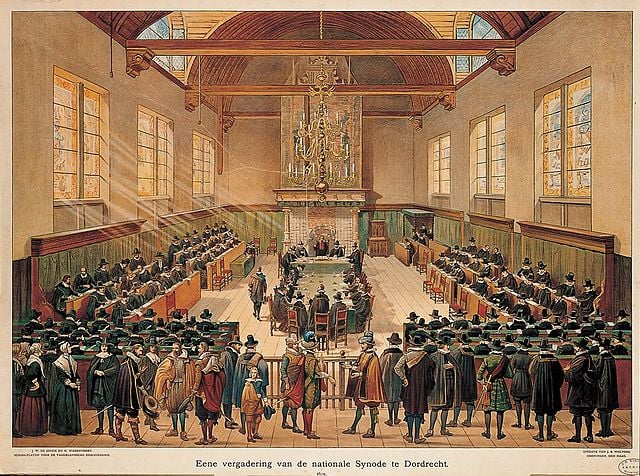Protestants Also Issue Plenty of Them (vs. James White)

Synod of Dort (1618-1619), in which Reformed Protestants anathematized the Arminian Protestants who disagreed with them [public domain / Wikimedia Commons]
***
(3-12-04)
***
White wrote in his book, Mary — Another Redeemer? (Minneapolis: Bethany House, 1998), in chapter four, devoted to the Immaculate Conception:
But just how serious this dogma is can be seen from what came
immediately after the definition:Hence, if anyone shall dare—which God forbid!—to
think otherwise than as has been defined by us, let him
know and understand that he is condemned by his own
judgment; that he has suffered shipwreck in the faith; that
he has separated from the unity of the Church; and that,
furthermore, by his own action he incurs the penalties es-
tablished by law if he should dare to express in words or
writing or by any other outward means the errors he think
in his heart.Here, with infallible and binding authority, the Pope forbids
anyone from even thinking otherwise than he has defined con-
cerning the Immaculate Conception. If you are led to a different
conclusion by the study of the Bible, or the study of history, you
are to submit your mind and your heart to the ultimate authority
of the Papacy, and reject even those conclusions derived from the
Word itself.
Mr. White acts as if this were the most novel and outrageous thing in the world: to require some tenet of faith to be held by the faithful, as if Protestants don’t do this, too. Of course, they do (all the time). Passing over the multitude of extraordinarily dogmatic statements from Luther and Calvin, anathematizing all who disagree (fellow Protestants and Catholics alike) with their own judgments (on entirely arbitrary grounds), we will examine a few of the Reformed creeds and confessions and discover that they take this exact same stance. The good Calvinist has to submit his “mind and heart to the ultimate authority of the creeds and confessions of Calvinism.” I don’t see how this state of affairs is all that different, in terms of being bound to some authority which offers an interpretation of the Bible and Christian doctrine.
Mr. White is a Calvinist (Reformed Baptist). One of the classic expositions of Calvinism was that set out by the Synod of Dort (1618-1619). We find statements from that synod such as the following, directed towards those who don’t accept the five points of Calvinism, or “TULIP” (which acronym derives from this very synod):
T = Total Depravity
U = Unconditional Election
L = Limited Atonement
I = Irresistible Grace
P = Perseverance of the Saints
Article 6: God’s Eternal Decision
*
The fact that some receive from God the gift of faith within time, and that others do not, stems from his eternal decision. For all his works are known to God from eternity (Acts 15:18; Eph. 1:11). In accordance with this decision he graciously softens the hearts, however hard, of his chosen ones and inclines them to believe, but by his just judgment he leaves in their wickedness and hardness of heart those who have not been chosen . . . This is the well-known decision of election and reprobation revealed in God’s Word. This decision the wicked, impure, and unstable distort to their own ruin, . . .
In it’s “Conclusion: Rejection of False Accusations,” the Synod declares, against Protestant Arminian Christians:
. . . the Synod earnestly warns the false accusers themselves to consider how heavy a judgment of God awaits those who give false testimony against so many churches and their confessions, trouble the consciences of the weak, and seek to prejudice the minds of many against the fellowship of true believers.
Note that this is entirely a dispute amongst Protestants. The great majority of Protestants today are Arminian, not Calvinist. They are all condemned by the rhetoric at Dort, and essentially read out of the Christian faith. I have dealt with this inconsistency and hidden assumption in White’s work in great detail, and shown how — by his own stated assumptions — people like Martin Luther, C. S. Lewis, and John Wesley were not, and could not be Christians. That is what his logic entails. Catholics, of course, do not deny that Protestants are Christians, or that they can be saved. See:
So Catholic dogmatic authority asserts that a person who rejects the Immaculate Conception has been “condemned by his own judgment” and has “suffered shipwreck in the faith.” Calvinist dogmatic authority asserts that people who reject predestination to hell of the reprobate and other tenets of five-point Calvinism (which multiple millions of Protestants reject), are “wicked, impure, and unstable” and do so “to their own ruin.” They are “false accusers” who will be subject to a “heavy judgment of God” if they continue in their ways. What’s the difference? In both cases, a teaching which is disagreed with by many many different kinds of Christians is made obligatory on followers of the professed faith, under penalty of the shipwreck of their faith or souls.
That’s not all. We have the habitual “anathematizing” treatment of the Catholic Church in other Protestant creeds and confessions, reading those who adhere to its doctrine out of the faith. For example, the Westminster Confession of 1646:
CHAPTER XXV. Of the Church*
VI. There is no other head of the Church but the Lord Jesus Christ: nor can the Pope of Rome in any sense be head thereof; but is that Antichrist, that man of sin and son of perdition, that exalteth himself in the Church against Christ, and all that is called God.
Likewise, the Second Helvetic Confession (1566):
CHAPTER XVII Of The Catholic and Holy Church of God,
and of The One Only Head of The Church*
. . . The Roman head does indeed preserve his tyranny and the corruption that has been brought into the Church, and meanwhile he hinders, resists, and with all the strength he can muster cuts off the proper reformation of the Church.
And the Belgic Confession (1561):
Article 29: The Marks of the True Church*
. . . As for the false church, it assigns more authority to itself and its ordinances than to the Word of God; it does not want to subject itself to the yoke of Christ; it does not administer the sacraments as Christ commanded in his Word; it rather adds to them or subtracts from them as it pleases; it bases itself on men, more than on Jesus Christ; it persecutes those who live holy lives according to the Word of God and who rebuke it for its faults, greed, and idolatry. These two churches are easy to recognize and thus to distinguish from each other.
How are these two stances all that different, authority-wise? The Catholic position was that if someone didn’t follow the pope’s teaching with regard to the Immaculate Conception, they were in big spiritual trouble. The anti-Catholic Calvinist position (thankfully, not all Calvinists are anti-Catholic, by any means) is that if someone follows any of the pope’s teachings, or those of the Catholic Church, he is following antichrist, a man who “hinders” and “resists” all proper reformation of the Church, denigrating the Bible, not subjecting himself to Christ, follows men more than Christ, is an idolater, etc.
If he doesn’t accept a doctrine like double predestination (where the damned, or reprobate, never had any choice but to be damned from eternity), he is “wicked” and “impure” and under a heavy “judgment of God.” How is one worse than the other? But of course, Bishop White will never point this out. His goal is to make the Catholic Church look utterly unreasonable, arrogant, and outrageous, while the Protestant sects who make exactly the same kind of statements — about doctrines which are highly-controversial — get a pass.
Coming up to our present time, and the ecumenical joint statement, Evangelicals and Catholics Together (ECT), we again find a vigorous anti-Catholic opposition. For example, prominent anti-Catholic Michael Horton (chairman of the Council of the Alliance of Confessing Evangelicals, and associate professor of historical theology at Westminster Theological Seminary in California), in his critical review of ECT, wrote (and surely White would agree):
If Rome continues to uphold the Decrees and Canons of the Council of Trent, all individual members of that body who follow those decrees (which, in Roman Catholic ecclesiology must include every faithful son or daughter) continue to stand in opposition to the unchanging Gospel of Christ. If they stray from the official teaching of Rome, either from ignorance or in opposition to those statements, they may be regarded as brothers and sisters in Christ.. . . the Roman See persists in its denial of the message that makes the church’s existence both possible and necessary.
. . . We deny that this catholic consensus is sufficient for recognizing the Roman church as a true visible expression of Christ’s body.
. . . We affirm that individual Roman Catholics, who for various reasons do not self-consciously give their assent to the precise definitions of the Roman Magisterium regarding justification, the sole mediation of Christ, the monergistic character of the new birth, and similar evangelical issues, are our brothers and sisters despite Rome’s official position.
[again, this is the condescending notion that a Catholic has to be a lousy, disobedient, dissenting Catholic in order to be a Christian]
James White makes many similar utterances, too numerous to recount. Here is one of the more striking ones:
The issue isn’t the Pope, the issue is the system he represents. The question, at the bottom of the issue, is, “Does Rome promote, or stand against, Christ’s work in this world?” The answer, in light of the “gospel” taught by Rome, is clear in my mind: she stands against the work of Christ. Hence, if we wish to use the term “antichrist,” it is the system that partakes of that spirit due to her opposition to the free grace of Christ.(statement on his own sola Scriptura Internet list: 8-16-96)
Now, again, I ask: why is it unacceptable for the Catholic Church to require its members to believe in the Immaculate Conception (where other Christians vigorously disagree), and give stern warnings for failure to do so, but it is perfectly acceptable for anti-Catholics to make far more extreme statements denigrating the Catholic Church altogether and some one billion Catholics? In each case, others who disagree and the relative state of their souls or “correct belief” are discussed, but the anti-Catholic statements are infinitely more sweeping and condescending. Therefore, what White proves, when this further relevant examination is brought to the table, is the existence of his own glaring double standards (as so often in his anti-Catholic polemics). His rhetoric backfires on him.











